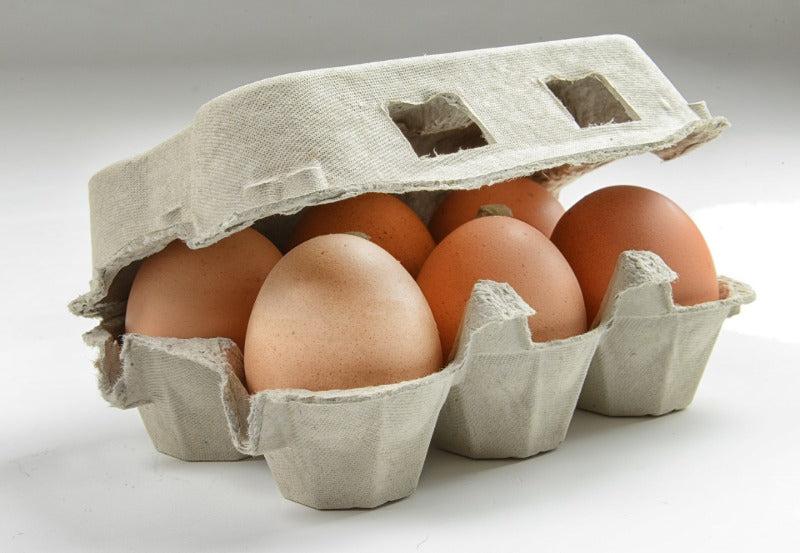This versatile food makes a great main course or side dish. But it may not be the best for your bearded dragon, at least not all the time. Can bearded dragons eat eggs? If so, should they be scrambled, boiled, raw? Can beardies eat the shell? Let’s unscramble all these questions about eggs!
Can You Feed Bearded Dragons Eggs At All?
Do bearded dragons eat eggs? (To be clear, we’re talking about chicken eggs here.) The answer is simple: Bearded dragons can safely eat up to half an egg every other week or so. This is primarily because eggs are rich in protein, which your beardie should already be getting from feeder insects.
There are some great perks to adding a little egg to your beardie’s salad every once in a while:
Protein. While baby beardies need significantly more protein than adults and even juvie dragons, it’s still an important nutrient for all bearded dragons, regardless of age. For babies in particular, it is vital for growth and development, but all around it also helps with energy, muscle and organ function, bone strength, a healthy immune system, and more.
Vitamin D. Eggs are a great source of Vitamin D, which bearded dragons need in their bodies to process calcium. Without the ability to process calcium, beardies can become deformed and their bones may soften. They may even die from this extremely painful condition, which is called metabolic bone disease (MBD). This can be prevented by ensuring your beardie is on a proper, balanced diet and by sprinkling Vitamin-D-infused calcium powder on his live feeder insects.
Additional vitamins. Eggs offer your beardie a healthy dose of Vitamin A, which promotes healthy skin, a healthy immune system, and good vision; and Vitamin B12, which boosts metabolism, energy levels, and brain function. They are also a good source of iron, which is particularly important for baby bearded dragon development.

Why Can’t Bearded Dragons Eat Eggs Frequently?
The main source of protein for your dragon should be insects, even for your baby dragon who needs 80% of her diet to be protein-based. On average, one egg has about 6 grams of protein. This varies a little based on the size of the egg.
When your adult, baby, or juvie dragon is already eating a steady diet of protein-packed feeder insects, they really don’t need eggs in their diet. A little bit of egg here and there is safe, but too much egg can cause health issues.
When a dragon has too much protein, he can suffer from the following:
- Diabetes
- Obesity
- Fatty liver disease
- Heart failure
There is one exception to the limiting-egg rule. If you happen to have a bearded dragon who doesn’t take too well to feeder insects or if you adopted a beardie who appears malnourished, it may be safe to add more eggs to their diet to improve their health.
However, if you do have a malnourished bearded dragon, please check with your vet about the best way to provide protein. That way you can make sure your beardie gets enough, but not too much, and you can verify that eggs are a safe option to try.
Can Bearded Dragons Eat Scrambled Eggs?
How do you serve eggs to your dragon? Raw? Omelette-style? Fried? You might wonder if you can simply scramble eggs for your dragon.
The answer is yes! Bearded dragons can safely eat scrambled eggs. They can also eat hard boiled eggs. Just remember these pointers:
- Adult bearded dragons should eat no more than half an egg at a time, max.
- If you're scrambling the egg, don’t mix any additional ingredients with it. This means no seasoning, no oil, no butter, no dairy, etc. Bearded dragons can’t tolerate dairy, and their digestive systems may not react well to oil and spices. You shouldn’t even use cooking spray, so be sure to use a nonstick frying pan or scramble the egg in the microwave.
- You can serve scrambled eggs with staple veggies, just don’t cook the veggies in with the eggs. You can mix them together after the egg is cooked and cooled.
- Boiled eggs should be peeled and chopped into small pieces.
- It’s best to feed your dragon eggs from free range, grass fed chickens.
Can Bearded Dragons Eat Raw Eggs?
Some Dragon Keepers wonder if they have to cook the eggs before serving them. The truth is, bearded dragons should not eat raw eggs. Raw eggs are likely to carry bacteria which can make your beardie very ill, possibly fatally ill. Feeding your dragon raw eggs is not worth the risk of getting your dragon sick.

Can Bearded Dragons Eat Eggshells?
Eggshells are absolutely packed with calcium, which is a very important mineral for bearded dragon development. So you may wonder if your bearded dragon can eat eggshells.
It’s not very safe to let your bearded dragon eat eggshells. Here’s why:
- Bacteria. Eggshells can contain harmful bacteria that will make your dragon sick.
- Dangerous to swallow. Eggshells would have to be ground to a powder to be consumed safely since the bits and pieces of egg shell can scratch your beardie’s throat and cause choking or gut impaction.
- Too much calcium. Even if you did decide to feed powdered eggshell, it can be very difficult to track how much your bearded dragon actually consumes. It’s generally easier to just dust their live insects with a powdered calcium supplement so you can keep track, because it is possible for bearded dragons to have too much calcium. Just like too little calcium, that can cause health issues too—specifically Hypercalcemia, a rare condition that weakens the muscles and can result in death.
All in all, scrambled or boiled eggs can be a safe way to introduce a little more protein to your dragon’s diet, as long as they aren’t fed too often.
If you have any questions or would like to give feedback, please email us at team@dragonsdiet.com








